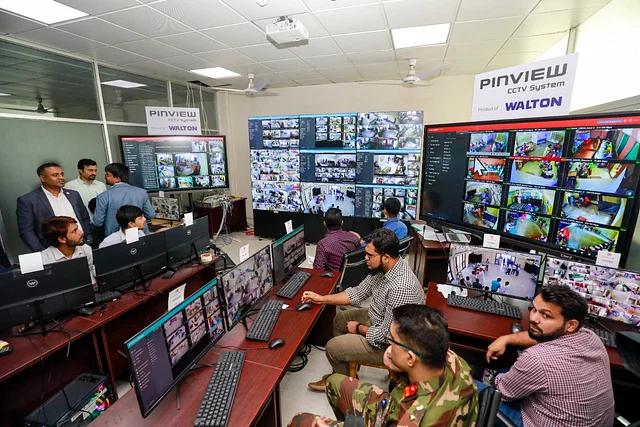
The Election Commission is withdrawing from the plan to install CC (Closed Circuit) cameras in all the polling booths in the upcoming National Assembly elections. The current election commission led by Kazi Habibul Awal took this plan after assuming office. However, this constitutional body now thinks that it will not be possible to implement this plan.
However, multiple high-level sources in the EC have said that after monitoring the election through CCTV in several local governments and national parliament by-elections, the commission feels that 300 parliamentary constituencies across the country will be simultaneously monitored by CCTV. They do not have the capacity to monitor the elections. The commission is now considering whether there is an alternative to prevent vote fraud or fake votes.
The current commission took over in February 2022.
The EC announced its action plan in October of that year ahead of the National Assembly elections. There, they identified 14 challenges or obstacles on the way to making the next 12th National Parliament election fair. The EC also mentioned 19 ways in its action plan to overcome these obstacles. One of them was the installation of CCTV cameras in every polling station.
Since the ‘one-sided’ National Assembly elections in the country in 2014, there has been an increase in incidents of widespread violence, seizure of centers, and looting of ballots in various local government elections. In the 2018 national elections, there were allegations that ballot boxes were stuffed the night before CC cameras voting. In later elections where Electronic Voting Machines (EVMs) were used, new tactics of irregularities were seen. One or more persons influence the voter by positioning themselves outside the voter in the secret voting room (booth). As a result, the voter cannot vote for the candidate of his choice.
In such a context, the EC plans to install CCTV cameras to prevent ‘robbers in polling booths’. The EC also used CCTV cameras in various local government elections including some ci In these polls, the polling situation is monitored centrally through CCTV cameras in the election building in Dhaka. Among them, on July 17, the by-elections of Dhaka-17 constituencies were voted on by paper ballots, and the EC used CCTV cameras there too.
According to several EC sources, the EC is assessing that there has been some benefit from installing CCTV cameras in the polling booths. This has reduced the trend of fraudulent voting, creating a sense of fear among those who tamper with polling stations.
Chief Election Commissioner Kazi Habibul Awal also said such things in the media.
The 12th National Assembly elections are scheduled to be held at the end of December this year or at the beginning of January next year. The number of polling stations and booths in the election has not been finalized yet. According to EC sources, there will be 44,000 polling stations in 300 constituencies in the upcoming national elections. And the voting room will be more than two hundred thousand. If one CCTV camera is installed in each room, more than 200,000 cameras will be required.
In order to install two more outside the polling booths, more than 300,000 CCTV cameras will be required. Centrally monitoring CCTV cameras will require a large number of manpower. Again, a big place like a stadium or Bangabandhu International Conference Center will be needed to monitor the matter centrally.
EC officials say that EC’s own manpower is busy with electoral work during elections. It is not possible to provide the manpower required to monitor 3 lakh CC cameras with 300 seats. Again, if the manpower is hired on contract from outside, there is doubt about whether they will monitor properly or not. Even in the elections that the EC has observed on CCTV so far, it has not been possible to keep all the centers under full surveillance. There has also been informal discussion about the use of artificial intelligence in this regard.
But it is time-consuming and expensive.
Election Commissioner Md. Ahsan Habib Khan that the commission has benefited from the use of CCTV cameras in several important elections in the past.
If they are active, it is possible to prevent fake votes. However, the responsible officials of several organizations monitoring the elections say that the election experience of the last decade has shown that the agents of the candidates of the opposition parties could not go to most of the polling stations. As a result, the idea of training polling agents to prevent fraudulent voting is unlikely to yield any effective results.
The issue of CCTV cameras in the polls is more discussed around the by-election of the Gaibandha-5 parliamentary seat. In this by-election held on October 12 last year, the EC installed CCTV cameras in every polling station. There are widespread irregularities in almost all centers. Later EC stopped this vote in the middle.